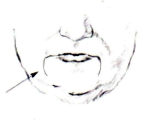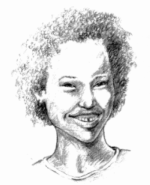This newsletter continues showing how a certain quality can be seen over and over in a person's face. Sensitivity is a very personal issue. Certainly, some degree of "feeling" is paramount to a person living life to the fullest. What face reading teaches us is that the feelings that register in our brains ultimately shape and/or mark our faces.
Here we will focus on three different kinds of sensitivity and the facial feature that reflects each one. Small irises indicate a person's sensitivity to the external world. Some lines show how deeply a person has been touched by life's events. Finally, a small chin indicates a person's sensitivity to criticism.
|
|
|
Small irises
 You are extremely sensitive and you were probably that way even as a child. Your heightened sensitivity to your external environment and the people in it had a lasting impact on you. Your experience of childhood may have felt somewhat painful partly because you felt everything so intensely. As an adult your sensitivity may cause you to be almost allergic to anyone raising their voice or shouting at you. In fact, any incessant loud noise or racket may be especially irritating to you. You are extremely sensitive and you were probably that way even as a child. Your heightened sensitivity to your external environment and the people in it had a lasting impact on you. Your experience of childhood may have felt somewhat painful partly because you felt everything so intensely. As an adult your sensitivity may cause you to be almost allergic to anyone raising their voice or shouting at you. In fact, any incessant loud noise or racket may be especially irritating to you.
Theory: Small irises are a defense mechanism of overly sensitive children in their attempt to block or screen out their external environment. It may be an external indicator or the child's retreat to the safety of their internal world. If you are in a relationship with someone with small irises, you will connect much better if your communication is done with moderate tones. |
|
Compassion lines
 You have experienced deep emotional grief, loss, and pain. Your traumatic life experiences have been gut wrenching and heart breaking but you have gotten through them. Your sensitivity to these life lessons have given you a greater depth and life awareness. Your empathy for the suffering of others is genuine because you have truly walked in their shoes and know how it feels. When you say to someone that you understand their grief, they feel the sincerity of your compassion. On an unconscious level they see it on your face. You have experienced deep emotional grief, loss, and pain. Your traumatic life experiences have been gut wrenching and heart breaking but you have gotten through them. Your sensitivity to these life lessons have given you a greater depth and life awareness. Your empathy for the suffering of others is genuine because you have truly walked in their shoes and know how it feels. When you say to someone that you understand their grief, they feel the sincerity of your compassion. On an unconscious level they see it on your face.
Theory: An insensitive person who is not in touch with their inner feelings rarely get these lines, while on a sensitive people these lines can appear on their face almost overnight. The magnitude of loss that typically creates these lines include the loss of a loved one, or the loss of an important relationship or the loss of a business or important job. However, on a truly sensitive person these lines may appear even after the loss of a beloved pet.
Additionally: Vertical lines on the upper lip or diagonal lines on the cheeks are also a sign of sensitivity. Survivor lines show a person's depth for having gone through something that might have overwhelmed a weaker person. Courage lines on the cheeks reveal that a person has faced fear and pulled themselves through.
|
|
Small chin

You are sensitive and may take criticism too much to heart. Another person's comments can be heard as criticism and hurtful to you even when they were not intended as such. You can, at times, be too hard on yourself, dwelling on perceived faults or failings that you would ignore in another person. Because you are so hard on yourself, so called "constructive criticism" may not be that helpful to you. It just feels like the other person is pointing out what you already know and judging you negatively for it.
Theory: At the reptilian brain level, small chinned people are seen as weaker than big chinned people. They have often been pushed around by those with bigger chins which makes them somewhat defensive. Small chins, even on people with wide faces and strong jaws, are a sign of a person's sensitivity to criticism. They just don't need it and the smaller the chin, the more severe their reaction will be to any kind of criticism or bullying.
|
|
Skin Type Also Reveals Sensitivity
Skin is our body's largest organ and also the contact point for our physical experience of the world. There are three basic skin textures and each type reflects a different personality. There is skin like an orange, skin like an onion and skin like an apple ( or rough, flaky, and smooth) Apple skin is very fine with small pores. It is like a baby's skin and like a baby reflects its owner's sensitivity.
People with apple skin feel the world intensely, sometimes too intensely. If you have ever thought you had a weight problem, check out your skin. If you have sensitive apple skin, your extra weight may be your body's defense to protect you from the bombardment of what feels like a harsh world. It's almost like you are trying to give yourself some extra space by pushing all that sensitivity away from you.
Also, adding an extra layer slows down the immediate impact of all that sensory input. On an unconscious level the amplification of your sensitivity by your apple skin may cause you to feel like some things are just too much. Becoming physically larger may give your the courage to face what may feel like an overwhelming challenge.
Oprah Winfrey is a good example of a sensitive person with apple skin. Her innate sensitivity in helping people deal with difficult issues has become her trademark. We may recall that Oprah lost a great deal of weight only to gain much of it back. Was her weight gain a lack of discipline or self preservation for a person with apple skin, living in a high pressure environment?
Before you go on that next self denying diet, check out your skin. If you have apple skin, first look at your environment to see if there is some source of irritation or aggravation that you are unconsciously protecting yourself from. Removing the source of irritation may be more effective in helping you lose weight than dieting.
|
|
Speaking of the website, it is completely new and upgraded with lots of information. Please take a look.
Thank you for your interest. I welcome your comments, questions and observations. You can e-mail me directly at
[email protected]
or my business partner,
Your feedback is valuable. My goal is to develop and use Amazing Face Reading as a tool to see everyone more clearly and compassionately. I really believe we can understand every person we meet on a deeper level.
Kind regards,
Mac
Mac Fulfer
Amazing Face Reading |
|
|

A Sensitive Child
You might be able to guess from the blond hair and blue eyes that this young girl is from Scandinavia, but what else can you know about her? A trained face reader instantly sees that she is also extremely sensitive. Her upturned eyes with large irises shows an optimistic and an emotionally open approach to life. Her broad cheeks and strong jaw line reflect her physically hardy Viking heritage, but she also has a small chin which shows she is very sensitive to criticism.
Is she really that sensitive? How can we be sure? A face is often its own self diagnostic and the (above) picture of this child is no exception. If we look closely, we can see that she has a small line from the left corner of her mouth indicating she has experienced emotional pain or loss in her personal life. This is a mark usually not seen on young children unless they have experienced a traumatic event and/or they are extremely sensitive.
Have you ever thought to read the face of your child in terms of sensitivity? Parents know that for some children it takes nothing less than dynamite to even get their attention. However, a child with a small chin can be wounded by an unconscious remark or seemingly harmless comparison. A parent, (or any adult) might say, "Susie is the smart one and Sally is the pretty one," thinking they were just making an innocent observation or giving a positive compliment. Truthfully, it may be completely ignored by the bigger chinned child. However, the same comparison can have lasting, life long consequences for a small chinned child. They may remember the remark for the rest of their lives as, "Mom said I wasn't pretty."
For parents it is important to remember that small chinned children can take criticism to heart and hear criticism where it was not intended. Even constructive criticism such as, " You were really good but next time..." can be taken as disapproval and proof of failure.
By understanding
the child's life experiences from the child's perspective, face reading can help parents bridge the proverbial generation gap.
The breakthrough is in discovering that there are as many different perspectives as there are people. What is exciting is we can instantly see it on every face we meet.
|
|
|
|
|
|